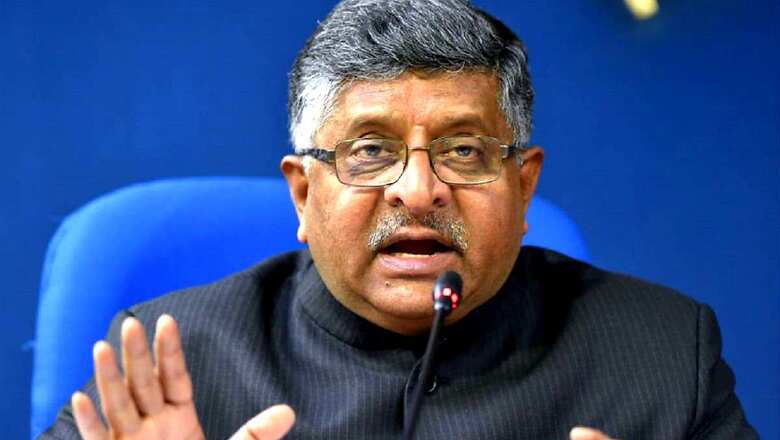
views
Amid a feud between the Central government and social media giant Twitter, in an exclusive interview with CNN-News18, Union IT & Law Minister Ravi Shankar Prasad said that India respects privacy, but “one has to give details when terror elements, anti-socials, anti-national are involved.”
“All these social media giants make huge gains in India, have a huge presence, where common citizens, journalists, editors, businessmen are trolled. We respect criticism and anyone can criticize us as this is a part of our democracy. But our laws are important and India shall not compromise its digital sovereignty,” Prasad said on the pushback from the management of the microblogging site.
India is a democracy governed by the Constitution, the laws, the media, and the judiciary, and Twitter should stop lecturing us on the benefits and merits of democracy, he added.
Prasad is echoing the government’s newly-formed social guidelines that require social media companies like Facebook, WhatsApp and Twitter to identify within 36 hours the originator of a flagged message as well as to conduct additional due diligence, including the appointment of a chief compliance officer, nodal contact person and resident grievance officer.
While Google, Facebook and WhatsApp have shared details with the IT Ministry as per the requirement of the new digital rules, Twitter is still not following the norms, PTI reported late Friday night citing government sources. Twitter has not sent details of the chief compliance officer to the IT Ministry, and shared details of a lawyer working in a law firm as a nodal contact person and grievance officer, the sources said.
Responding to a query on breach of privacy allegation, Prasad said, “There has to be an India-based Redressal officer. They must learn to respect the constitution of India, we respect privacy. You have to give details only when terror elements, anti-socials, anti-national are involved.”
Some people do their politics on Twitter, now they do politics with Twitter, he added.
On Thursday, the row over Twitter’s handling of certain messages had escalated into an all-out war of words, with the government saying the messaging platform was levelling baseless and false allegations to defame India and dictating terms to the world’s largest democracy. It started with Twitter calling the visit by Delhi Police to its offices a form of “intimidation” — a statement which met with vociferous protests from both the government and the Delhi Police. While the government called it “totally baseless, false and an attempt to defame India”, Delhi Police said the statement was “mendacious” and designed to impede a lawful inquiry.
Complete privacy shall be maintained, he added.
Further responding to the Central government’s notice to Twitter for showing Leh as part of Jammu and Kashmir instead of the union territory of Ladakh Prasad said, “Ladakh as part of China? ..Double standards are visible vis a vis India and the US and other countries. Media has grievance redressal mechanism. The issue is that the intention should be there.”
Upon asking if Facebook innocently shared data with Cambridge Analytical or not, he said, “You can go to the court, why don’t you approach the Indian government. Indian parliament is as sacrosanct as the American Parliament. consent of every Indian should be important and we believe in technology. We did not get the power of this social media joint, we came to power because the people of India trust us.”
The fresh regulations for all social media platforms and digital news outlets called the ‘Intermediary Guidelines and Digital Media Ethics Code’ came into effect from Wednesday. These guidelines have asked all social media platforms to set up a grievances redressal and compliance mechanism, which included appointing a resident grievance officer, chief compliance officer, and a nodal contact person. The Ministry of Electronics & Information Technology had also asked these platforms to submit monthly reports on complaints received from users and actions taken.
The third requirement which has been widely criticised for instant messaging apps was to make provisions for tracking the first originator of a message.
Read all the Latest News, Breaking News and Coronavirus News here. Follow us on Facebook, Twitter and Telegram.




















Comments
0 comment